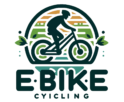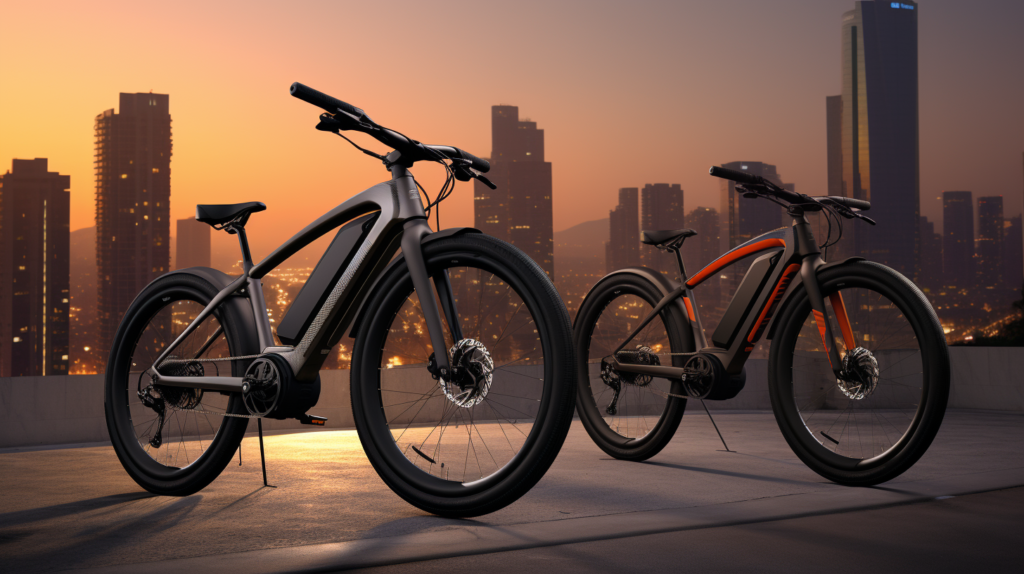When you’re comparing Aventon and Trek ebikes, you’re not just looking at two wheels and a motor, you’re examining value and innovation side by side.
Aventon offers a price-conscious option with robust features, while Trek brings a legacy of quality with a higher price tag.
You’ll dive into the models, eyeing Aventon’s affordability against Trek’s refined designs.
Speed enthusiasts must contrast top speeds, as Aventon might edge out with a little extra zip.
You’ll consider reliability and efficiency, where Trek’s reputation shines.
If supporting domestic production is key for you, Trek’s partial US manufacturing could tip the scales.
As you weigh these factors, remember you’re choosing more than a bike; you’re selecting a companion for your road ahead.
Value and Innovation
When comparing Aventon and Trek ebikes, you’ll notice that each brand brings its own unique innovations and value propositions to the table.
Aventon, with its roots in fixed-gear bikes, has transitioned into the ebike space prioritizing affordability without skimping on performance. Their Level series, especially the Level 2, exemplifies this with a robust 750W motor and a 672Wh battery, pushing the envelope with a top speed of 28mph. The ‘throttle only’ mode is a nod to traditional cycling experiences, diversifying riding options for the user.
Trek, on the other hand, stands on over four decades of industry presence, with a reputation for integrating cutting-edge technology into their designs. Their ebikes boast the Removable Integrated Battery system, enhancing the aesthetic appeal by concealing the power source. Coupled with the Bosch motor—synonymous with reliability and efficiency—Trek ebikes are testament to their commitment to innovation and quality.
Both brands cater to different market segments. Aventon’s value lies in providing powerful specs at a more accessible price point, appealing to budget-conscious riders seeking reliable performance. Trek’s ebikes are positioned for those who prioritize advanced technology and are willing to invest in higher-end models.
As you weigh your options, consider that Aventon’s approach to value is through tangible performance features and competitive pricing, while Trek’s definition of value is rooted in a legacy of quality and advanced technological integration. Your preferences in terms of budget, design, and the importance of technological features will guide your choice between these two reputable brands.
The models
You’re likely curious about how entry-level and premium models from Aventon and Trek compare in terms of features and value.
It’s essential to analyze the specifications, performance, and price points of these ebikes to understand which brand might suit your needs best.
Let’s examine the differences and similarities between the offerings to guide your decision-making process.
Entry-Level Ebike Models
Exploring entry-level ebike options, you’ll find Aventon’s Pace 500 and Trek’s Verve+ 2 standing out as affordable, reliable choices for both beginners and budget-conscious cyclists.
The Aventon Pace 500, with its 500W motor, offers a robust top speed of 28 mph and a commendable range of up to 60 miles, positioning it as a strong contender for urban commuting. It also benefits from a torque sensor and hydraulic disc brakes, enhancing rider control and comfort.
In contrast, the Trek Verve+ 2, with a 250W motor, reaches a top speed of 20 mph and promises a range of up to 50 miles. It features a Shimano 9-speed drivetrain and a sturdy rear rack, making it a versatile option for hybrid ebike enthusiasts.
Both models reflect their brands’ commitment to quality and performance at an entry-level price point.
Premium Ebike Models
As you consider upgrading to a premium ebike, Aventon’s Aventure and Trek’s Rail 9.9 XTR Gen 3 stand out as top-of-the-line models that offer advanced features for a more exhilarating ride. These models are engineered for performance and comfort, but they come with distinct specifications and advantages that may influence your choice:
- Aventon Aventure: Equipped with a 750W motor and a 720Wh battery, this off-road fat tire ebike boasts a top speed of 28 mph and up to 60 mile range on a single charge.
- Trek Rail 9.9 XTR Gen 3: Features a mid-drive motor with 85Nm of torque and a 750Wh battery, with a top speed of 20 mph tailored for mountain biking.
- Display and Connectivity: Aventon offers a Full Color Display with app syncing, while Trek provides a simpler LCD display.
- Warranty: Both brands offer a 2-year warranty, but Aventon extends coverage to electrical components.
Top speed
When comparing the top speeds between Aventon and Trek ebikes, you’ll find that Aventon models can reach up to 28 mph with pedal assist, outpacing Trek’s 20 mph maximum. This speed discrepancy is quite significant, especially if you’re looking for an ebike that can keep up with faster traffic or simply enjoy the thrill of a swift ride.
Delving into specifics, Aventon’s Level 2 ebike is equipped with a 750W motor that empowers it to achieve that impressive 28 mph speed. This makes it a strong contender for those seeking both power and pace in their rides. In contrast, Trek ebikes often utilize the reliable Bosch motor system, which is known for its efficiency and durability but typically caps out at 20 mph.
However, it’s crucial to consider that the higher top speed of Aventon bikes comes with certain requirements. For instance, to hit 28 mph, you’ll need to engage the pedal-assist feature, which may not be suitable for all riders or legal in all areas. Strict regulations in some locations may limit the use of higher-speed ebikes on public roads and trails.
From a practical standpoint, the top speed should be weighed against other factors such as range, comfort, and utility. While Aventon offers a quicker ride, Trek’s design prioritizes integration and aesthetics, with features like the Removable Integrated Battery system contributing to a more streamlined look.
Ultimately, your choice between Aventon and Trek may hinge on personal needs and local laws. If top speed is a priority for you, Aventon’s offerings may align more closely with your desires. However, if you’re more concerned with brand heritage, design, and perhaps a broader service network, Trek’s ebikes might be a better fit.
reliability and efficiency
You’ll want to consider that while both Aventon and Trek ebikes offer solid performance, their reliability and efficiency may differ due to variations in motor systems and component quality. When you’re investing in an ebike, these factors are crucial as they dictate not only how your bike handles daily wear and tear but also how well it performs over time.
Here’s what you need to know to weigh your options:
- Motor and Battery Life: Trek uses the Bosch motor system, renowned for its reliability and longevity. Aventon, while offering robust motors, may not have the same pedigree in terms of motor lifespan and battery efficiency.
- Warranty and Support: Both brands offer warranties, but with different coverage. Trek’s warranty doesn’t extend to electrical components, which could mean additional costs if these parts fail. Aventon offers a more comprehensive 2-year warranty that includes electrical components.
- Quality of Components: Trek’s long history in bike manufacturing has led to a reputation for high-quality components. Aventon also uses quality parts, but there can be variability in the longevity of these components.
- Technological Features: Aventon’s Full Color Display with app connectivity offers a modern touch, potentially enhancing your riding experience with additional features. Trek’s simpler displays may lack these capabilities, which could be a deciding factor depending on how tech-savvy you are.
In essence, your choice should be informed by what you value most. Do you prioritize a bike with a high-tech interface and comprehensive warranty, or do you lean towards a brand with a longstanding reputation for component quality? By analyzing these aspects, you’ll be able to determine which bike aligns best with your expectations for reliability and efficiency.
USA Built
Considering the origins of your ebike, Aventon’s assembly takes place overseas, while Trek proudly builds its electric bikes in the USA, ensuring local quality control and domestic job support. This distinction is crucial for you as a consumer, as it not only reflects on the manufacturing ethos of both companies but also impacts the broader economic and social landscape.
With Aventon manufacturing abroad, there’s potential for cost savings which may be passed down to you, offering a more affordable product range. However, the overseas production can sometimes raise concerns about the working conditions and environmental regulations in the manufacturing countries.
In contrast, Trek’s commitment to American-built bikes supports the local economy and maintains stricter oversight on production standards. This adherence to US labor laws and environmental policies often translates to a higher price point, but it assures a level of quality that’s monitored within a more regulated framework.
It’s important to consider the implications beyond the price tag and features. Trek’s USA-built promise not only fosters domestic employment but might also appeal to your sense of patriotism or your preference for products made within stringent regulatory environments. On the other hand, Aventon’s international manufacturing allows for competitive pricing that might align better with your budget.
When weighing your options between Aventon and Trek, think about the broader impact of your purchase. It’s not just about the bike’s performance on the road; it’s also about the values you support within the cycling industry and the larger economic ecosystem. Your decision has the power to influence market trends and manufacturing practices globally.
Conclusion
In evaluating Aventon and Trek, you’re faced with a classic trade-off: Aventon’s cost-effectiveness and tech-savvy features versus Trek’s premium design and reputation for reliability.
While Aventon entices with a comprehensive warranty and robust app integration, Trek’s build quality and brand pedigree may justify its higher price for some.
Ultimately, your decision should hinge on which brand’s balance of innovation, performance, and support best aligns with your riding priorities and budgetary constraints.

